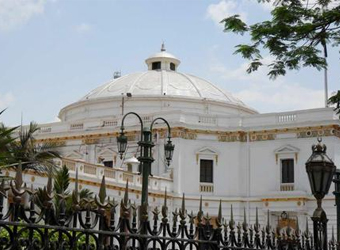Board members of Egypt’s Higher Press Council and the Press Syndicate decided Sunday to boycott the Egyptian parliament’s first hearing session on two new media laws.
The session, organised by Parliament’s culture, media and antiquities committee, was only attended by MPs and representatives from some state-owned or national press organisations, such as Ali Hassan, chief editor of the government-owned Middle East News Agency (MENA), and Abdel Mohsen Salama, deputy chief editor of Al-Ahram newspaper.
Head of the committee Osama Heikal said invitations were directed to all board members of the Higher Press Council and the Press Syndicate.
“But I was surprised by their decision not to come,” said Heikal, adding that “I was also surprised that the council’s spokesman and high-profile journalist Salah Eissa has issued a statement announcing that he will not attend sessions on the new media laws under the claim that they were not revised by the State Council.”
Heikal insisted that “the law was put to debate only after the State Council had completely finalised revising them.”
Some sources said Eissa and other Higher Press Council members believe that the unified media law was divided into two laws upon the recommendation of some media MPs like journalist Mostafa Bakri, and not upon the order of the State Council.
Heikal indicated that upon the recommendation of the State Council, two laws on the media – rather than one – were referred to parliament: one to create three media regulatory bodies and the other seeking to supervise the media as a whole.
“In its debate, the committee will make sure that the two laws observe six articles that govern the media in Egypt’s 2014 constitution,” said Heikal.
Heikal also indicated that “the two new media laws are not government-drafted ones as some might claim.”
“These laws were prepared by a special commission that comprised a number of experts on media laws from the Press Syndicate, the Higher Press Council and the Ministry of Justice,” said Heikal, adding that “but when a unified media law reached its final station, the State Council recommended that it be divided into two laws – one on regulatory bodies and one on media conditions as a whole.”
“The council made this recommendation upon the grounds that the constitution states a unified press law must first gain the approval of three media regulatory bodies – the Higher Council for Media Regulation (HCMR), the National Press Organisation (NPO), and the National Media Organisation (NMO) – before it is enacted into final legislation,” Heikal added.
Joining forces, Mahmoud Fawzi, a legal advisor to parliament speaker Ali Abdel-Aal, argued that “the State Council’s recommendation for two media laws – instead of one – is a logical step and must be observed to guarantee that these laws do not contravene the constitution.”
Heikal said: “Board members of the Higher Press Council and the Press Syndicate should attend the committee’s coming hearing sessions without imposing preconditions.
“I still have open invitations for them to come at any time to reach consensus on the interests of the press and media community in Egypt.”
Independent MP Mostafa Bakri and MENA’s chief editor Ali Hassan launched a scathing attack against the Higher Press Council, accusing its members of doing their best to delay the release of new media laws.
“They want to stay in their positions without any legal grounds,” said Hassan.
He said the legal term of the current Higher Press Council has expired and a new one should be appointed.
Al-Ahram’s deputy chief editor Abdel Mohsen Salama said there is a pressing need that new media laws be passed in Egypt.
“Since 2011, we have suffered from two higher press councils. The first was formed when the Muslim Brotherhood was in one office to serve its interests and the second was dominated by leftists who want to keep their grip on the press community in Egypt,” said Salama.
Mokhtar Shoeib, an assistant to Al-Ahram’s chief editor, said the new media laws should be carefully debated and discussed in parliament.
“The government and the executive authority should not have any hand in selecting heads of the three media regulatory bodies,” said Shoeb, proposing that “institutions, like the independent Press Syndicate and civil society organisations, have the greatest say in naming heads of these bodies.”
Source: Ahram Online
